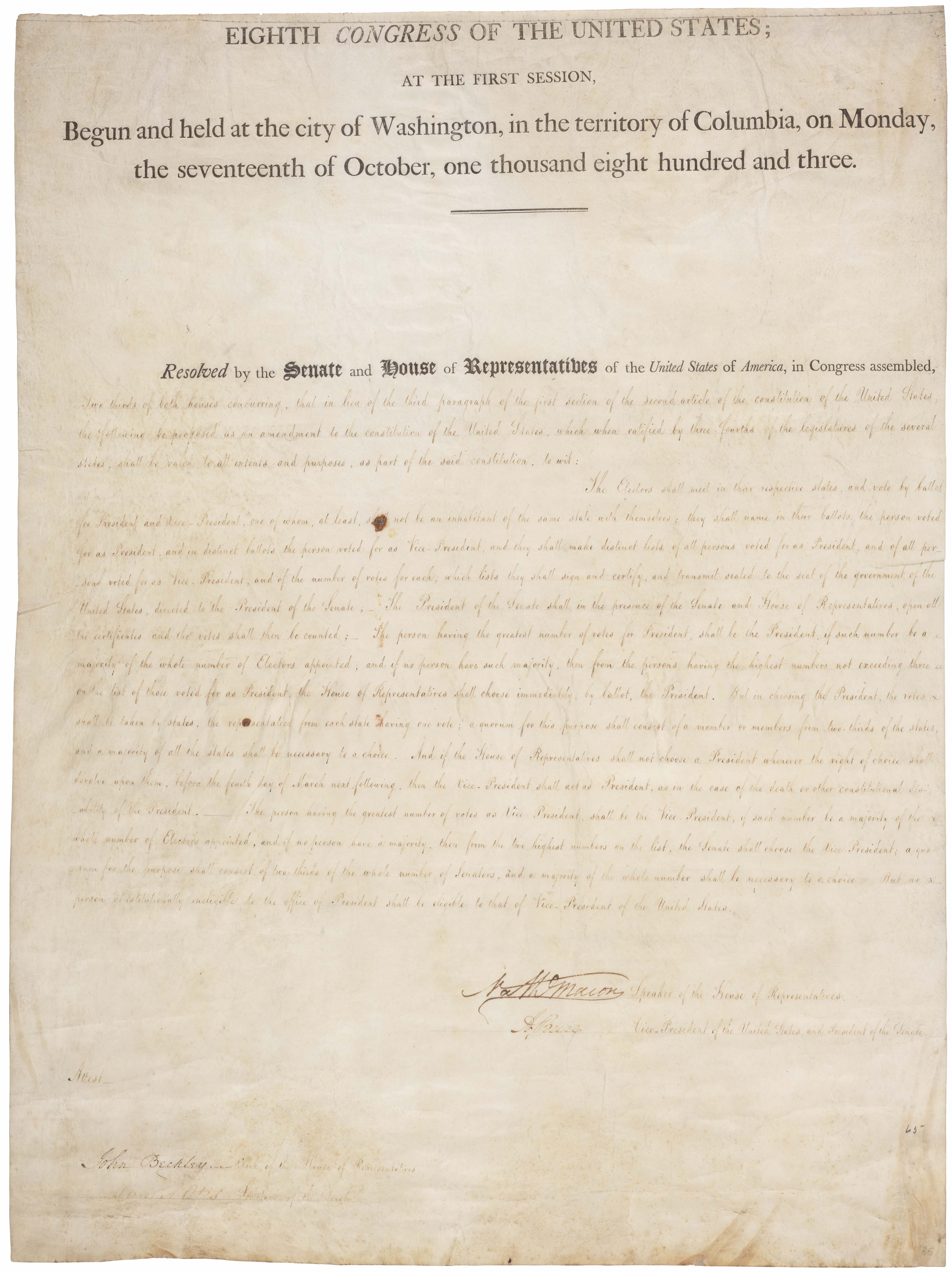Kezdő posztnak legjobb a blog nevének eredetére fényt világítani.
A tizenkettedik módosítás (kiegészítés) szabályozza az elnökválasztás módját. Bár a választási kampány már javában tart, amelyik az előválasztással kezdődik, és amelynek felén már túl lévén, nagyjából tiszta, hogy mi várható, mégis érdemes ezzel kezdeni, mert ez az alapja mindennek.
"The Electors shall meet in their respective states, and vote by ballot for President and Vice-President, one of whom, at least, shall not be an inhabitant of the same state with themselves; they shall name in their ballots the person voted for as President, and in distinct ballots the person voted for as Vice-President, and they shall make distinct lists of all persons voted for as President, and all persons voted for as Vice-President and of the number of votes for each, which lists they shall sign and certify, and transmit sealed to the seat of the government of the United States, directed to the President of the Senate.
The President of the Senate shall, in the presence of the Senate and House of Representatives, open all the certificates and the votes shall then be counted.
The person having the greatest Number of votes for President, shall be the President, if such number be a majority of the whole number of Electors appointed; and if no person have such majority, then from the persons having the highest numbers not exceeding three on the list of those voted for as President, the House of Representatives shall choose immediately, by ballot, the President. But in choosing the President, the votes shall be taken by states, the representation from each state having one vote; a quorum for this purpose shall consist of a member or members from two-thirds of the states, and a majority of all the states shall be necessary to a choice. And if the House of Representatives shall not choose a President whenever the right of choice shall devolve upon them, before the fourth day of March next following, then the Vice-President shall act as President, as in the case of the death or other constitutional disability of the President.
The person having the greatest number of votes as Vice-President, shall be the Vice-President, if such number be a majority of the whole number of Electors appointed, and if no person have a majority, then from the two highest numbers on the list, the Senate shall choose the Vice-President; a quorum for the purpose shall consist of two-thirds of the whole number of Senators, and a majority of the whole number shall be necessary to a choice. But no person constitutionally ineligible to the office of President shall be eligible to that of Vice-President of the United States."
(A dőlt betűs részeket a huszadik alkotmánykiegészítés felülírta.)
Röviden és magyarul: az amerikai elnökválasztás nem demokratikus elven működik, nem a legtöbb szavazatot kapó jelölt lesz az elnök, hanem a legtöbb elektori szavazattal lehet elnöknek lenni. A különböző államok különböző számú elektort küldhetnek az elnökválasztásra, és ők választanak elnököt. Az alapító atyák szilárdan hittek abban, hogy a meritokrácia elvén működő, tekintélyes emberek alkotta grémiumnak kell elnököt választania, és elvetették a népfelség elvén működő demokráciát; ők köztársaságot akartak, mint ami a római államforma is volt. Idővel egyébként egyre inkább a demokrácia felé mentek el a választási szabályok; a legtöbb állam tiltja az elektornak, hogy megváltoztathassa szavazatát, és név szerinti szavazások vannak, nem titkosak.
Annak, hogy elektori gyűlés van, és nem csak a szavazattöbbség dönt, van jelentősége. Esetek többségében amelyik jelölt a legtöbb szavazatot kapja, ő lesz az elnök is, nagyon ritka, ha nem így van, de előfordul: legutóbb pl. George H. Bush előtt fél millió szavazattal nyert Al Gore, mégis Bush lett az elnök. Azaz ez a szabály felülírja a popular vote-ot.
Vannak el nem kötelezett elektorok is, sőt, nagyon ritka, de az elektorok megváltoztathatják a szavazataikat, őket faithless electornak hívják. Az USA politikatörténetében egyetlen egy alkalommal sem fordult elő, hogy ennek bármilyen hatása is lett volna a történtekre, nem is nagyon van már lehetősége az elektornak erre.
A Képviselőháznak egyetlen alkalommal, 1824-ben volt leheősége élni azzal a jogával, hogy saját maga válasszon elnököt. Ebben az évben az elnökjelöltek közül egy sem ér el többséget az elektori gyűlésen. Tekintettel arra, hogy 1824-ben négy jelölt volt, és így négyfelé oszlottak a szavazatok, és az amerikai pártrendszerben gyakorlatilag két nagy párt van a számtalan "third party" mellett, ennek az esélye nagyon kevés, mert egy harmadik jelöltnek államot is kell nyernie, nem csak szavazatokat, hogy egyáltalán szavazni lehessen rá (mert anélkül nem lesz elektora; illetve egyszer, 1836-ban alelnököt választott ilyen módon a Szenátus).
